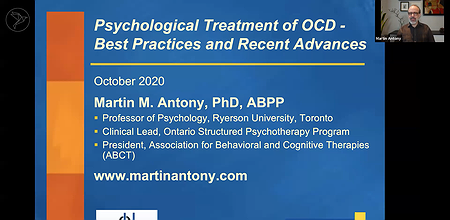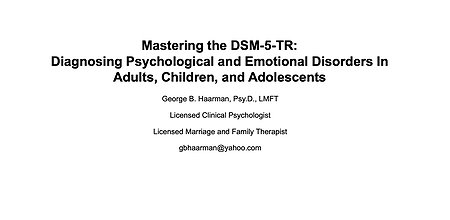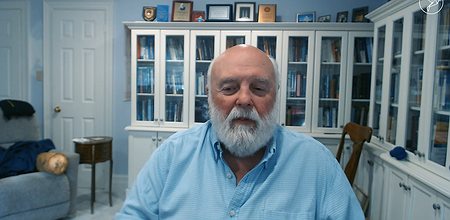A theoretical course illustrated with clinical examples. This course is composed of videos of 5 to 15 minutes each. The PowerPoint of the course to download.
Advanced Diagnosis of ADHD
Dr. Caroline Buzanko, Psychologist
A transformative workshop that redefines ADHD assessment through a neuroaffirmative, real-world lens - moving beyond checklists to deeper clinical clarity.
Excerpt:
- 6h of continuing education
- 39 lessons that last from 5 to 15 minutes each
- 1 certificate of achievement
- 1 PowerPoint
- 1 bibliography
- 1 course evaluation
- 4 months unlimited access
- 7-day money back guarantee
- 97% of participants who completed the satisfaction survey declare they would recommend this course to a colleague
Overview
Despite its prevalence, accurately distinguishing ADHD from other emotional, developmental, and behavioural conditions remains a significant challenge.
This advanced-level workshop is designed for those who want to move beyond tests and checklists. You will deepen your understanding through a comprehensive, strengths-based, neuroaffirmative model of ADHD assessment, grounded in ecological validity and real-world functioning.
Instead of reducing ADHD to a list of surface behaviours, you will learn to interpret it through the lens of executive functioning, developmental age, environmental context, gender, and neurodivergent processing styles.
You will explore how to detect ADHD even in its most subtle or masked forms, and how to differentiate it from co-occurring conditions such as anxiety, mood disorders, learning disabilities, and autism.
Led by Dr. Caroline Buzanko, award-winning psychologist and international speaker, this workshop offers a powerful reframing of what ADHD is - and what it is not.
During the course of this workshop, you will learn how to: - Build a clinical framework for differential diagnosis, seeing ADHD as a condition of performance and inconsistency - not incompetence. - Implement a multi-informant, multi-method assessment approach that is collaborative, culturally responsive, and gender-aware. - Strengthen your ability to engage parents and clients as co-assessors, promoting diagnostic acceptance and shared understanding. - Apply lifespan-informed strategies, adapting to symptom evolution, masking, and developmental transitions - from early childhood through adulthood.
By the end, you’ll leave with sharper diagnostic insight, a more confident clinical voice, and practical tools to support meaningful, accurate, and affirming outcomes for your clients.
About the expert

Dr. Caroline Buzanko is a licensed psychologist since 2009, mother, and international speaker. She is the clinical director of Koru Family Psychology based in Alberta and an adjunct assistant professor at the University of Calgary. She works with kids, teens, and their families to maximize confidence, forge resilience, and foster strong connections. With over twenty years working with families, her focus is on developing long-term success and well-being by creating meaningful change. She also trains other mental health professionals and educators to optimize their effectiveness working with children and teens.
Learning objectives
- Conduct accurate diagnostic assessments and differentiate ADHD from other neurodevelopmental, emotional, and behavioural conditions
- Utilize an ecologically valid, multi-modal, and multi-informant assessment approach for diagnosing ADHD from a strengths-based perspective
- Implement ADHD assessment strategies across the lifespan
- Develop skills in effectively collaborating with parents/clients, communicating results while engaging stakeholders
Learning material
Syllabus
- PowerPoint
- 1. Introduction
-
Understanding & Conceptualizing ADHD
- 2. DSM 5 TR Criteria Is Deficit Based & Not Neauroaffirmative
- 3. Medical vs. Social Model
- 4. Rethinking ADHD
- 5. Address Challenges and Criticisms
- 6. Textbook Approach
- 7. Parent Connection
-
Phase 1: Intake
- 8. Engage Parents Through Preparation
- 9. Interviews
- 10. Teacher and Student Interviews
-
Phase 2: Formal Assessment
- 11. Communicate with Parents Throughout
- 12. Assessment Success
- 13. Clinical Measures
- 14. Rating Scales part 1
- 15. Rating Scales part 2
- 16. Psychological Processes
- 17. Neuropsychological Testing
- 18. Psychometrist vs. Clinician
- 19. Clinic Observations
- 20. Assessment Process- Clinical Risks
- 21. Assessment Across the Lifespan
- 22. Adult ADHD- Beyond Childhood Symptoms
- 23. Assessing Impairment Challenges for Adults
- 24. Gender-bias
- 25. Comorbidities and Alternatives Explanations
- 26. Differential Diagnosis- Autism vs. ADHD
- 27. Comorbid ADHD and Autism
- 28. Measuring ADHD vs. Anxiety & Mood
- 29. ADHD and Externalizing Disorders
- 30. Interpreting & Integrating Data
- 31. The Use of Flow Charts
- 32. Decision Making Tree
- 33. Best Practice When Making a Diagnosis
-
Phase 3: Communicating Results
- 34. Maximizing Uptake
- 35. Flipping Vulnerabilities
- 36. Parents Must Have Understanding
- 37. Communicating Collaboratively
- 38. Follow Up and What's Next
- 39. Conclusion
- Bibliography
CE Credits
Download a certificate of successful completion.
Audience
This course is intended for mental health professionals.
Registration
Ask a question
Do you have a question? Then email us at contact@asadis.net
Frequently asked questions
-
How long do I have access to the course?
After your registration, the course is accessible anytime and from anywhere for 124 days.
-
When does the course start?
That is entirely up to you! When you buy a course, you'll receive an access link that you can activate when you want.
-
Is there a student rate?
Yes there is! To learn more, email us at contact@asadis.net.
Legal notice
The courses offered by ASADIS are accredited by different professional organisations. In addition, ASADIS is approved by the Canadian Psychological Association to offer continuing education for psychologists. ASADIS maintains responsibility for the program.
The CPA’s approval of an individual, group, or organization as a CE Sponsor or Provider is restricted to the activities described in the approved application or annual report form. The CPA’s approval does not extend to any other CE activity the Sponsor or Provider might offer. In granting its approval, the CPA assumes no legal or financial obligations to Sponsors, Providers, or to those individuals who might participate in a Sponsor or Provider’s CE activities or programs. Further, responsibility for the content, provision, and delivery of any CE activity approved by the CPA remains that of the CE Sponsor or Provider. The CPA disclaims all legal liability associated with the content, provision, and delivery of the approved CE activity.





